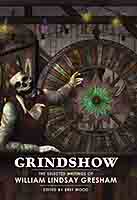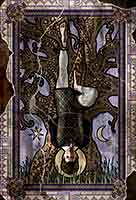

Ed here: Continuing last night's post. Here's a piece I wrote about Nightmare Alley and Gresham in 2008. I spent three hours reading into Grindshow today and it's a dazzler. There is a dark desperation to a life overwhelmed by poverty and alcoholism when it searches into the occult and the supernatural aspects of carny life--as well as other venues. Gresham's great aggrieved search is a fascinating statement by a man who was both a poet, a journalist and a novelist.
Excerpted from Hardboiled Maryland:
Excerpted from Hardboiled Maryland:
William Lindsay Gresham
"Nightmare Alley belongs not to the hard-boiled world of Dashiell Hammett and James M. Cain, but to the dark and shadowy world of noir. As a literary term, noir can be applied to any work--especially one involving crime--that is notably dark, brooding, cynical, complex, and pessimistic. Nightmare Alley is certainly all that and more, described by one critic as "a tough, relentless, colorful novel that exposes the private world of the freaks in order to comment on a sick, degrading society." The novel depicts the rise of Stan Carlisle from a carnival mentalist to a successful "spiritualist," preying on the rich and gullible matrons of society, to his eventual fall and total disintegration.
"Gresham's depressed vision of society colored his private life as well; he was an alcoholic and an abusive husband to his wife Joy Davidman, as well as to their children. Joy eventually fled to England with their children, where she conducted a long-term love affair with the author C. S. Lewis, whom she eventually married (their story was recently told in the 1993 film Shadowlands). In 1962 Gresham committed suicide in a run-down hotel room in New York, where he had registered under the name "Asa Kimball, of Baltimore." The only tribute paid to him in the New York Times came from the bridge columnist."
Ed here: Whenever the subject of crime fiction as serious literature comes up the first novel I think of is Nightmare Alley. The book was of its time and Gresham was certainly influenced by the preceding generation of writers. In places you hear James T. Farrell, W.R. Burnett as well as one of his contemporaries, Nathaneal West. But ultimately Greshman was his own man and there is no novel quite like it in noir.
Unlike the writers I've mentioned, however, Gresham offered no hope. There are two kinds of people in the world, he seemed to believe, predators and victims. The book is marked by a mordant existential undertow that charts not only the downfall of Stanton Carlisle but also the few who care about him. The astrological references that shape the story and its thrust create an otherworldly tone as eerie as parts of the carnival itself.
There are many fine books about carnival life in American literature. Jim Tully's work comes to mind, for example. Ray Bradbury gave the carny world a fantastical twist. And Fredric Brown's The Fabulous Clipjoint which creates a kind of hardboiled lyricism for the desperate world it shows us.
But the nod goes to Gresham. A major novel and a true masterpiece.

2 comments:
Agreed, which makes the movie a major disappointment with its upbeat ending.
Those covers look fabulous! I'll have to hunt down these editions! Fine review!
Post a Comment